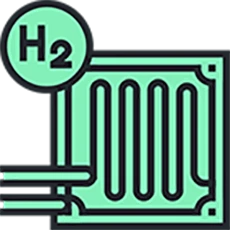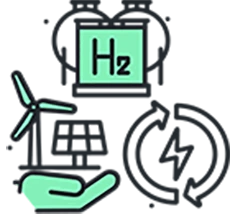Hydrogen Grid and Energy Storage
Empowering energy resilience and reliability through hydrogen grid and storage solutions.
Learn MoreHow It Works
By integrating hydrogen technologies into energy systems, we can create a more resilient, sustainable, and efficient energy landscape that supports the growing demands of modern society.
Hydrogen Fuel Cell Generators
for Data Centers and Digital Currency Mining

Hydrogen fuel cell generators are emerging as a sustainable and efficient power source for data centers and digital currency mining operations. By utilizing hydrogen fuel cells, these operations can leverage low-cost, renewable energy sources like solar and wind to produce hydrogen, which is then used to generate electricity.
Learn moreHydrogen and Batteries

Combining hydrogen and batteries in energy systems offers a powerful solution for storing and managing renewable energy. Batteries provide quick, efficient short-term storage, while hydrogen offers long-duration storage with higher energy density.
Hydrogen Micro-Grids and Grid Support

Hydrogen micro-grids and grid support represent innovative approaches to energy generation, distribution, and storage. These decentralized systems can operate independently or in conjunction with the main grid, using hydrogen as a primary energy carrier.
Hydrogen Energy Storage

Hydrogen energy storage is a versatile and scalable solution for storing excess energy. Hydrogen energy storage systems offer long-duration storage capabilities, making them ideal for balancing intermittent renewable energy sources and providing a reliable energy supply.
Benefits
Energy Resilience
Hydrogen provides reliable backup power and grid stability, crucial for energy resilience across communities.
Long-duration Storage
The high energy density and long-duration storage capabilities of hydrogen complement intermittent renewable sources like solar and wind.
Emissions Reduction
Hydrogen reduces carbon emissions by integrating renewable energy more effectively into energy grids and power systems.
Flexibility and Scalability
Flexible and scalable solutions for energy storage and grid support accommodate varying energy demands and enhance overall energy systems.